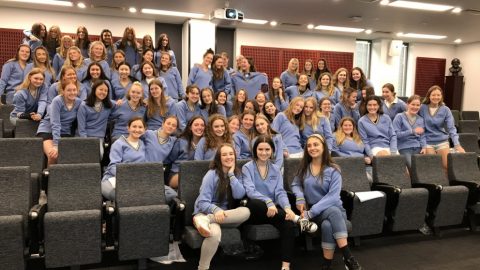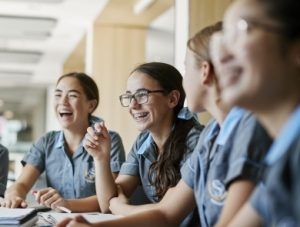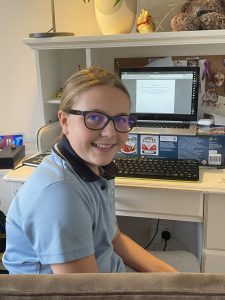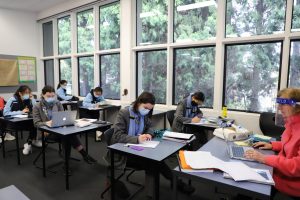Principal Update – life beyond school is rapidly changing

 An essential element of education is to prepare and transition students successfully to the next round of their journey, for most graduates, tertiary study and then beyond, to the world of work. Needless to say, a life beyond school is rapidly changing in its structure and formation and one could only suggest the current flexible online and offline approach will endure well beyond this COVID-19 phase. Changes that many of us predicted would happen over decades are instead taking place in the span of weeks.
An essential element of education is to prepare and transition students successfully to the next round of their journey, for most graduates, tertiary study and then beyond, to the world of work. Needless to say, a life beyond school is rapidly changing in its structure and formation and one could only suggest the current flexible online and offline approach will endure well beyond this COVID-19 phase. Changes that many of us predicted would happen over decades are instead taking place in the span of weeks.
As a result of the COVID-19 pandemic, an estimated 2.7 billion people, or more than four out of five workers in the global workforce, have been affected by lockdown and stay-at-home measures. Most organisations’ first priority this year has been a crisis management response as well as emphasising health, safety, essential service and the virtualisation of work and education. Now, as we look to 2021, organisations must begin to emerge and shape their ‘new normal’. Undoubtedly, this will not simply be a return to the old ways of doing business. What has been created is an imperative and an opportunity to reinvent workplaces.
In preparing young people for a changing workforce, schools too must accommodate, balance and embrace these changes to enable the potential of their students and long-term success. It is anticipated that many global organisations will engage in a hybrid model in which people will work remotely much of the time yet come together with team members for specific functions.
The views on how schools need to emerge from the COVID-19 crisis are certainly divergent and capture the demands of new workplace environments, yet acknowledge the very essence of character formation and the transformation of young people at schools. Indeed, we need to guide young people in our care to connect with genuine meaning that empowers them to live a life of purpose.
Andreas Schleicher, OECD was quick off the mark back in April, urging education leaders to use the momentum created by the COVID-19 pandemic to “rethink what and how students should learn to prepare for the needs of an interconnected 21st century”.
“You’re going to have a lot of young people who have experienced different forms of learning in this crisis, learning that was more fun, more empowering,” he said. “They will go back to their teachers and say: can we do things differently?”
The pandemic has also thrown the spotlight on the benefit of schools as public institutions. Glen Savage, Education Policy Lecturer at the University of Western Australia, highlights the critical role schools play in the socialisation of young people and this remains an ongoing theme of discussion for educators.
“Some people talk about not needing a traditional classroom any more. I think that’s rubbish,” he says. “If anything, COVID has taught us that schools provide much more than a young person’s learning program … they’re where future citizens are created”.
Schools are about people, relationships and community. While online has its advantages and teaching and learning can take place effectively, we cannot replace the physical experience of school. As we enter the final week of Term 3, students are repeatedly telling us they “miss their friends and teachers” yet they have competently demonstrated that they can successfully engage with independent learning, within some boundaries and structures suitable for their age.
 The experiences of the St Catherine’s Learn@Home program have been resoundingly positive, albeit the duration for some is now questionable and we look forward to their return next term. The girls have demonstrated remarkable and sustained enthusiasm for a more flexible mode of teaching and learning. Our senior students are, today, asking for greater independence and options for their learning going forward. There are elements that the girls identify as immensely helpful for their learning; for example, being able to control the pace of learning when teachers pre-film segments in VCE subjects that can be replayed to check for understanding or revision purposes. We look forward to exploring these options further with students, teachers and parents with the aim of capturing the very best aspects of the Learn@Home program by tailoring curriculums and classrooms environments to optimise the opportunity exposed, and embraced, this year by a global pandemic.
The experiences of the St Catherine’s Learn@Home program have been resoundingly positive, albeit the duration for some is now questionable and we look forward to their return next term. The girls have demonstrated remarkable and sustained enthusiasm for a more flexible mode of teaching and learning. Our senior students are, today, asking for greater independence and options for their learning going forward. There are elements that the girls identify as immensely helpful for their learning; for example, being able to control the pace of learning when teachers pre-film segments in VCE subjects that can be replayed to check for understanding or revision purposes. We look forward to exploring these options further with students, teachers and parents with the aim of capturing the very best aspects of the Learn@Home program by tailoring curriculums and classrooms environments to optimise the opportunity exposed, and embraced, this year by a global pandemic.
Term 4 Planning
Following the government announcement on Sunday and the extension of the Stage 4 restrictions for metropolitan Melbourne, all Learn@Home programs will continue for the last week of Term 3, inclusive of the ELC children.
We look forward to the return of students in Term 4. Needless to say, I would have preferred opportunity for all students, most notably, Years 3-9 to attend school immediately, even if in a hybrid model of a few days each week. Currently, the return to school structure outlined by the Education Minister is quite rigid, with little room for schools to offer greater flexibility to families.
 Of key importance is the necessity for all Year 11 and 12 students across Victoria to undertake the General Achievement Test (GAT) that was rescheduled from June to Wednesday 5 October. The outline of the return to school by the Victorian Government is somewhat designed around this date to avoid any school closures brought about by diagnosed cases in the community. The GAT offers an essential comparative benchmark for schools and within the context of such a turbulent year for VCE years, will be critically important for the calculation of VCE results.
Of key importance is the necessity for all Year 11 and 12 students across Victoria to undertake the General Achievement Test (GAT) that was rescheduled from June to Wednesday 5 October. The outline of the return to school by the Victorian Government is somewhat designed around this date to avoid any school closures brought about by diagnosed cases in the community. The GAT offers an essential comparative benchmark for schools and within the context of such a turbulent year for VCE years, will be critically important for the calculation of VCE results.
As such, the following Return to School is planned with the understanding that COVID-19 case numbers will be within predetermined ranges across metropolitan Melbourne.
Term 3
Week 10, Friday 18 September
- Curriculum Planning Day for Staff with no classes for ELC-Year 12 scheduled.
Term 4
Week 1, Monday 5 October
- Early Learning Centre children return to campus for face-to-face learning;
- Learn@Home program resumes for all Prep – Year 12 students;
- On campus supervision to continue under DHHS Regulations;
- Illawarra Boarding House re-opens for return of boarders.
Wednesday 7 October
- General Achievement Test (GAT) on campus for all Year 11 and 12 students studying Units 3 and 4 subjects;
- Years 7-9 Wellbeing Afternoon Online Activities.
Thursday 8 – Saturday 9 October
- Trial VCE Exams and pre-scheduled SACs on Campus for all VCE Unit 3 and 4 Subjects.
Week 2, Monday 12 October
- Barbreck: Prep to Year 2 students return to campus and Years 3-6 continue with Learn@Home Program;
- Years 10-12 students return to campus for face-to-face learning and Years 7-9 continue in Learn@Home program.
Week 3, Friday 23 October
- Victorian Public Holiday for the AFL Grand Final
Week 4, Monday 26 October
- Return to campus Years 3-9
Week 5, Monday 2 November and Tuesday 3 November
- Melbourne Cup Holidays


